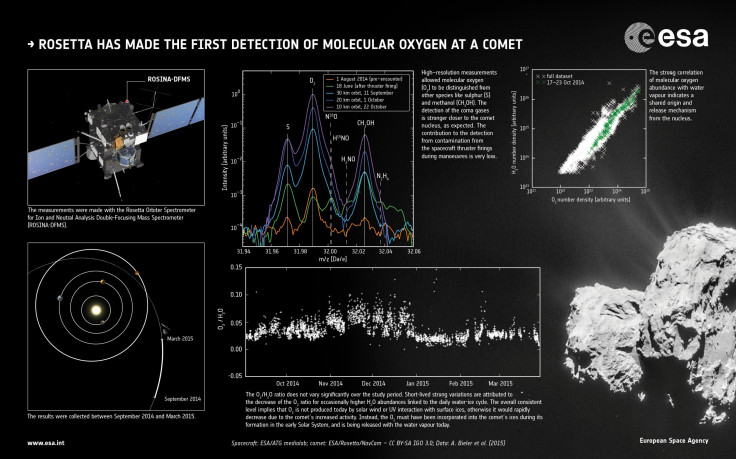Rosetta Detects Oxygen Older Than The Solar System At Comet 67P/Churyumov-Gerasimenko

A year after rendezvousing with comet 67P/Churyumov-Gerasimenko, the European Space Agency's Rosetta spacecraft continues to challenge the general understanding of the universe. After previously detecting water vapor, carbon monoxide, carbon dioxide and argon, Rosetta has now sniffed oxygen at the comet. The first ever detection of oxygen at a comet also raises new questions about solar system formation.
The oxygen discovery was announced Wednesday. Rosetta is currently orbiting comet 67p as the object makes its journey around the sun. Molecular oxygen, O2, is extremely reactive, which makes its survival on a comet as old as the solar system quite shocking.
"It’s also unanticipated because there aren’t very many examples of the detection of interstellar oxygen," Kathrin Altwegg, from the University of Bern, and principal investigator of the Rosetta Orbiter Spectrometer for Ion and Neutral Analysis instrument, ROSINA, said in a statement.
With over 3,000 samples -- collected from September 2014 to March 2015 as the comet headed toward the sun -- the Rosetta team discovered a link to the amount of water (H20) present at the comet. After ruling out several explanations for the O2's origins, the researchers believe the oxygen may have been locked inside the comet during its formation billions of years ago.
"We believe this oxygen is primordial, which means it is older than our Solar System," lead author Andre Bieler, from the University of Michigan, said. Conventional understanding of the formation of the solar system states an interstellar gas and debris collapsed, was heated and formed the sun. The rest of the gas and dust formed a planetary disk where the planets, comets and asteroids were formed. All of this requires heat, which would have eliminated O2.
In addition to messing up the current solar system formation model, the oxygen discovery could hinder the search for life in the cosmos, according to the Associated Press. Oxygen and methane are considered strong evidence of life because they vanish pretty quickly, but the discovery adds a new wrinkle to the hunt for aliens.
© Copyright IBTimes 2024. All rights reserved.






















